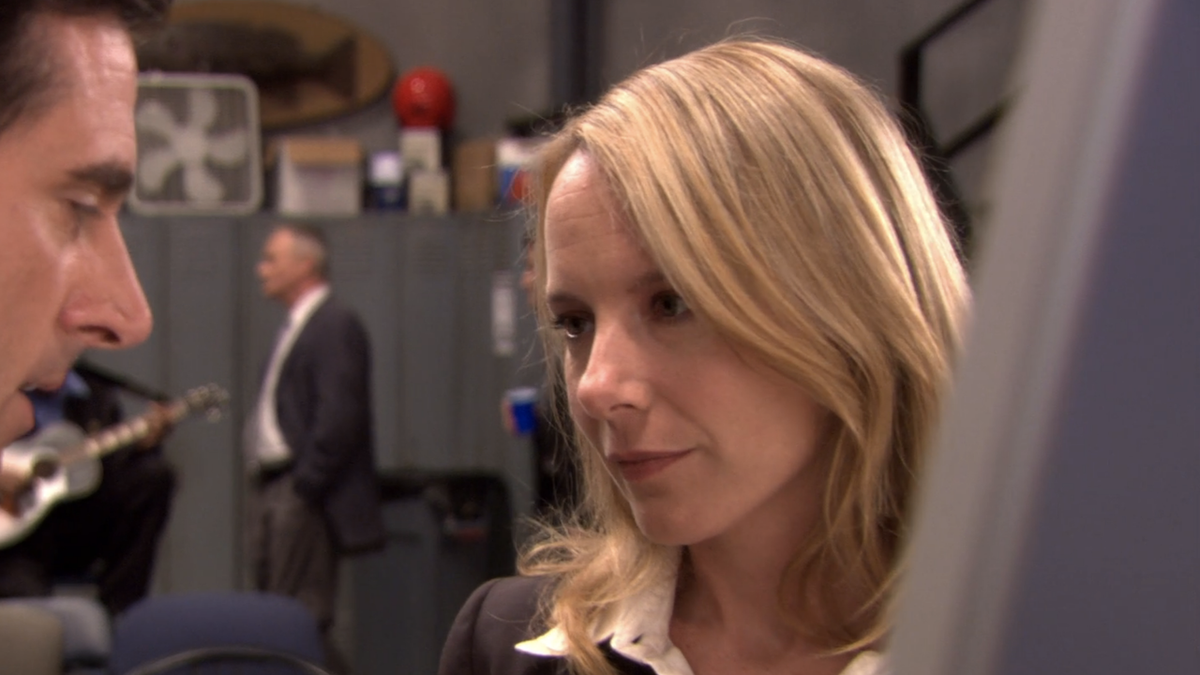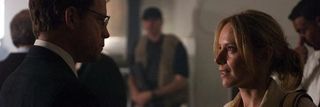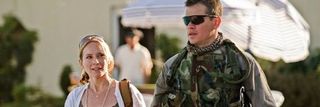Interview: Amy Ryan Tells Us How To Prepare For War Coverage In Iraq

When listing versatile actresses in Hollywood, it’s hard to ignore Amy Ryan, who one year can put play the despondent mother of a kidnapped child in Gone Baby Gone only to turn around and play a goofball love interest for Steve Carell’s character on The Office. And what’s more, she played both roles brilliantly, earning her an Oscar nomination and immense praise.
In Green Zone, Ryan plays Wall Street Journal reporter Lawrie Dayne, the writer who was the first to break the story of found WMD intelligence in Iraq, but quickly discovers that instead of being the fourth estate monitoring the government, she has become an unwilling pawn. Check out the interview below, where she discusses how she came to the project, the unused potential endings for her character and how she prepared for her role.
So, did you go after the project or did this project come after you?
I heard about the project, but yeah, I went after it. It was actually just after the Globes and then the Oscars and so I felt like maybe I have a little bit of a chance here. And I was talking to my friend Ben Affleck and I said, “Your friend Matt Damon’s making a movie,” but I had already been in the running for it apparently. But yeah, this was one to chase after.
We’ve heard a lot of improvisation is on these movies. How did you know about the character before you started shooting, and how did it change as you went?
Well we had a script. We had a real beginning-to-end script which was beautifully made and structured, and the way Paul works is he takes that and uses that as the road map and the boundaries, and most of the scenes are in the script. A lot of it changed though. We got rid of a lot of things that maybe didn’t feel like the truth at the time to where we were going. We’ll meet in the morning, read over the scene we have and just kind of cherry-pick from that and then get it in our own words. Paul works mostly in collaboration, but it’s about searching for the truth, it’s not about just experimenting or being greedy.

Was your character based on someone real, and have you spent any time talking to any reporters who were in the field out there?
CINEMABLEND NEWSLETTER
Your Daily Blend of Entertainment News
She’s a fictional character, but she certainly represents the press at that time. Paul and I decided what would be more interesting is finding a character who had spent their whole career writing about WMD, and here, here comes your big moment. And then towards the end of the film, again, she also represents the hope of the press, of the people, who did go that extra mile to double-check and triple-check a source, and to get the real story out, to really search for the truth.
Did you ever have any kind of interaction with any of the reporters who were there?
A friend of mine put me in touch with Anne Garrels, which is a friend of his, and she very generously talked me through just what her experience was as a reporter, as a woman, and even minor detail – what would be packed in her bag as she went out for the day, what her notebook what would like. When I first got her on the phone I thought, “Okay, she’s going to tell me a lot about the politics,” but straight away, she’s like, “Okay, don’t let them put you in army fatigues,” and I thought, “We’re girls, we’re talking about clothes already.” The detail was important to her as well, and I really admired that.
What would be in her bag? What does a journalist bring into the Green Zone?
We had pens and paper, and a bottle of water. There was the TracPhone they had – is that what it’s called? And certainly her camera and food – food and water.
So there’s all this action going on around you, and your character is a bit more mellow. Were you ever like, “I just really want to jump out of a helicopter”?
Well, there was a version where I died. And there was a version where I lost my leg. And one day, news came in that I lived, and I was kind of disappointed. I wanted to get in on that action, yeah. But it was fun, so instead I just walked with good strong purpose.
What was your reaction when you saw the final product?
I gotta say, it was crazy. We shot in London, Morocco and Spain, all doubling as Iraq. But some days we just had us, a Jeep and a big blue tarp over the doorway, and then when I saw the film the first time, there was Baghdad burning in the background, and there was even a palm tree that wasn’t there, there were some people that weren’t there, and that is truly just cinema magic. I heard Jason say before, and I agree with him, it’s bigger than us, the story, and it deserves to be seen on a big screen.
What was your experience like on location?
Yeah, Morocco is an incredible place if you haven’t been. I love Morocco – it’s a real challenge to all five senses. You think you know something, and you don’t. It’s wonderful. It keeps you on your toes that way.

You said that you like your work to actually mean something. Do you feel that Green Zone has the potential to do that?
Yes, yeah, absolutely. There’s the element of just pure entertainment. You can go on this wild roller coaster ride of this action thriller, but I believe at the end of the day, people will say, “Well, what do I believe? What did I believe? What matters? Is it true? Is that how we got into this in the first place?” Because so many people didn’t want to believe it, as we all know. I do think it’ll matter. I guess it’s about timing as well, when people want to face it or not.
Did you get to meet any of the soldiers who worked on the film, and what was that experience like?
That was humbling. There’s an element of any job you’re on – it’s a lot of camaraderie, sharing stories and you’re new best friends. And I remember one day, you know, here’s our nice catered lunch, and here we are in sunny Morocco, and we all’ve got our fake sweat and dirt on, and I just looked over and it struck me for a moment: I said, “Oh, you know, I go home to New York after this. And they, some of them are going back for their third or fourth tours.” And it stopped me, it really stopped me in my tracks. And I remember the day that we filmed the scene where we – where I meet Matt’s character in the Green Zone by the swimming pool – and when the soldiers, when they came onto set and saw the pool – and it was pretty much pared-down for what you see in the movie because a lot of CGI was added – but they said, “This was there?” They’re seeing the props of the Pringles and the Pizza Hut, and one of ‘em’s like, “I would’ve been fucking pissed!” “No way, no way.” And the same – and I just heard Matt tell a story that one of them said like, “So, you’re telling me I’ve been shitting in a hole for a week, and these guys are eating Pizza Hut?” They were shocked, they were shocked. But they were an incredible group of guys.
What particular parts of your character's story are actually from true stories?
I imagine you’re speaking mostly of Judith Miller and her involvement and the articles she wrote for the New York Times, but again, it is, it’s based on a fictional character. It could’ve been a man, could’ve been any outlet. I certainly brought my own opinions to it, what I believe to be true. But again, I had to approach it from the actor, the character’s point of view. I didn’t much go for what was fact and fiction out there as opposed to the world in our script, what we were saying and going from there.
One half of the country might decidedly think it’s agitprop or that it’s liberal Hollywood and anti-war. How would you address something like that?
Well to start with my character, I think she represents both sides because she starts out as someone who is that information, and then at the end that she represents the other side of reporters trying to get the truth out. I think any movie – any movie that shows soldiers with helmets on – people naturally think there must be a side. You play war, you take a side. But I don’t think this film takes side so much. Even the character Freddy, he goes up against Matt Damon, he says, “It’s not for you to decide what happens in my country,” so you even see it from that perspective. As Americans we keep going, “Well it’s only a Republican side and a Democratic side,” but over and over keep forgetting about the other country’s side. I like that the film brings that point up.

Eric Eisenberg is the Assistant Managing Editor at CinemaBlend. After graduating Boston University and earning a bachelor’s degree in journalism, he took a part-time job as a staff writer for CinemaBlend, and after six months was offered the opportunity to move to Los Angeles and take on a newly created West Coast Editor position. Over a decade later, he's continuing to advance his interests and expertise. In addition to conducting filmmaker interviews and contributing to the news and feature content of the site, Eric also oversees the Movie Reviews section, writes the the weekend box office report (published Sundays), and is the site's resident Stephen King expert. He has two King-related columns.
Most Popular








